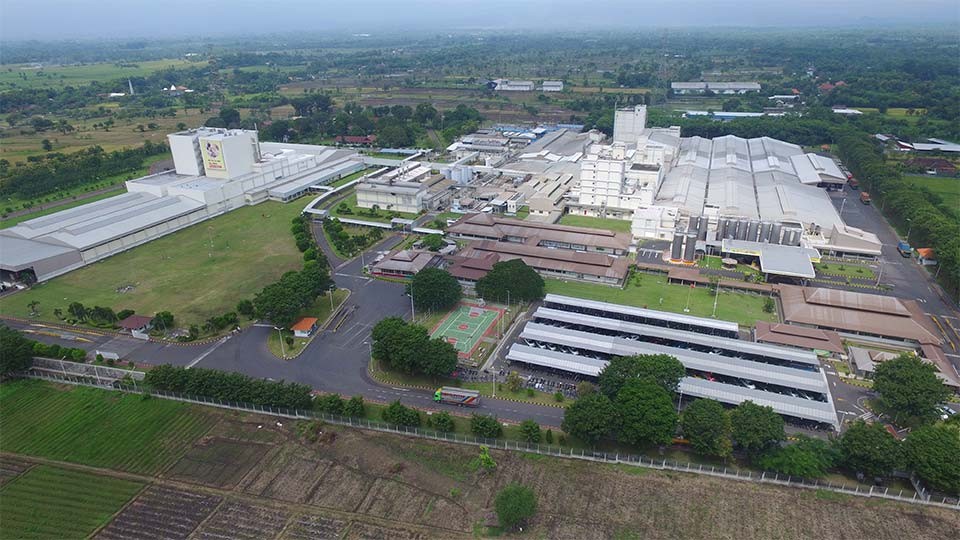
PT Nestlé Indonesia factory in Karawang West Java. The BKPM recorded investment realization of Rp 809.6 trillion (US$59.1 billion) last year. Of the amount, Rp 423 trillion came from realized foreign direct investment, while the rest came from domestic direct investment.(Handout/Nestle)
The government plans to open up almost all business sectors to foreign investment and issue a positive investment list in an omnibus bill on job creation.
According to a draft of the bill obtained by The Jakarta Post, all business sectors will be open to direct investment, except those declared prohibited from such activity or those that can only be handled by the government.
The prohibited areas are narcotics, gambling, chemical weapon industry, ozone-depleting substances, coral extraction and fishing activities for endangered species based on the Convention on International Trade in Endangered Species of Wild Fauna and Flora (CITES).
Meanwhile, the sectors that can only be handled by the government are those related to public services or defense and security, such as primary weapons defense system, state-owned museums, as well as flight and sailing navigation systems.
Further details on the investment will be regulated in a presidential regulation, the bill states.
Currently, the government issues a Negative lnvestment List (DNI), in which it regulates business sectors that are open, prohibited or open with certain conditions for foreign investment.
“If the language in the draft refers to foreign investment and the promised changes in the DNI are real, it would be welcome news for investors,” American Chamber of Commerce (AmCham) Indonesia managing director Lin Neumann told the Post on Saturday.
Neumann said there were many sectors such as health care, education and medical device manufacturing in which openness of 100 percent foreign ownership would draw major interest from American companies. “The real key will be if the government continues to move away from protectionism toward openness.”
“Greater openness together with real labor reform could make Indonesia competitive again and spur the kind of investment growth the government says it wants,” he said. “But frankly, it is too early to tell if that will happen because the sweeping omnibus laws will be a major test for Jokowi.”
President Joko “Jokowi” Widodo’s administration submitted the highly-anticipated draft to the House of Representatives for deliberation last Wednesday after several postponements. Jokowi expects the deliberations to conclude within 100 working days, as the government strives to attract more investment to help improve the country’s sluggish economic growth.
Indonesia’s economy grew 5.02 percent last year, lower than 5.17 percent in 2018, as investment and exports cooled. Investment – the second-largest contributor to gross domestic product (GDP) growth – expanded 4.45 percent last year, a far cry from the 6.67 percent growth recorded in 2018.
Indonesian Chamber of Commerce and Industry (Kadin) deputy chairman Raden Pardede said the government’s initiative could potentially lead to much higher realized investment.
However, he went on to say, the government should also provide more protection for local businesses, including small and medium enterprises. “We are open to foreign investment but only if it provides high-quality jobs and transfer of knowledge to our workers.”
The bill deletes a provision in the current Investment Law that says the government is obliged to determine business sectors that are set aside for micro, small and medium enterprises (MSMEs), as well as cooperatives and sectors that are open to big business, under the condition that it is compulsory for them to work with MSMEs and cooperatives.
It instead stipulates the government’s obligation to ease, empower and protect MSMEs and cooperatives in investment activity.
Such a protection include training and small business development through partnerships, human resource training, financing access and promotion, among other things.
The government will also provide tax incentives for investors that expand their businesses or make new investments. The incentives will be granted to those investing in labor intensive industries, infrastructure and pioneer industries, carrying out technology transfer and developing tourism, among other things.
The government is pushing for tourism and digital economy to be the new economic growth driver amid stagnated spending and softened exports.
The government will also introduce a priority investment list to welcome more investment into the country, according to presentation material by the Office of the Coordinating Economic Minister.
“Several businesses are included on the priority list, namely high-tech companies, digital companies, labor-intensive industries and business fields with large investment,” the material reads.
“The plan is to issue the list in the form of a Perpres [presidential regulation] instead of in the omnibus bill,” Investment Coordinating Board (BKPM) head Bahlil Lahadalia said in Jakarta on Feb. 5.
“If the Perpres is issued in February, it will take effect in March,” Bahlil said, declining to provide details.
The BKPM recorded investment realization of Rp 809.6 trillion (US$59.1 billion) last year. Of the amount, Rp 423 trillion came from realized foreign direct investment, while the rest came from domestic direct investment.
Centre for Strategic and International Studies (CSIS) economic department head Yose Rizal Damuri raised concerns over the government’s plan to introduce a positive list.
“The omnibus bill already highlights the prohibited sectors for investment. This should mean that all other sectors are open [to investment],” Yose told the Post.
“I cannot say for now whether this will certainly boost investment but this could lead to a manufacturing boom and reduce unemployment,” he said.
---
















